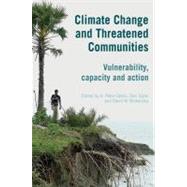- ISBN: 9781853397356 | 1853397350
- Cover: Paperback
- Copyright: 3/1/2012
Global climate change disproportionately affects rural people and indigenous groups, but their rights, knowledge, and interests concerning it are generally unacknowledged. Shifts in precipitation, cloud cover, temperature, and other climatic patterns alter their livelihood pursuits and cultural landscapes, accentuating their existing social and economic marginalization. This book argues that planners and researchers of climate change mitigation and adaptation must take into account the knowledge and capacity of rural people, and engage them as active participants in the design and governance of interventions, not as a matter of courtesy, but because it is their right. Furthermore, inclusion of local communities in genuine partnership will likely make climate change adaptation and mitigation efforts more effective.Climate Change and Threatened Communities presents 15 case studies and a variety of approaches to document the capacities and constraints to be encountered among communities facing changing climates in Bangladesh, Cameroon, Canada, Ecuador, Ethiopia, India, Indonesia, Italy, Malawi, Mexico, Mozambique, Peru, South Africa, Sudan, United States, Vietnam, and Zimbabwe. It explores human interactions in environments ranging from subarctic tundra to equatorial rain forest, from oceanic lagoons to inland mountains. Chapters investigate issues such as social vulnerability to climatic uncertainty, shifts in livelihood practices, local perceptions of climatic change, and the potential and limitations of the United Nations Programme on Reducing Emissions from Deforestation and Forest Degradation in Developing Countries. Authors consider the potential of archaeology, phenomenology, controlled comparisons, historical analysis, gender analysis and other analytical approaches to shed light on the experiences of communities and their members. This book is important reading for policy makers, academics, and students in the fields of climate change adaptation, anthropology and development studies, as well as more general readers.






